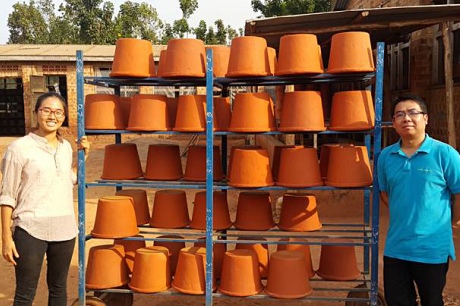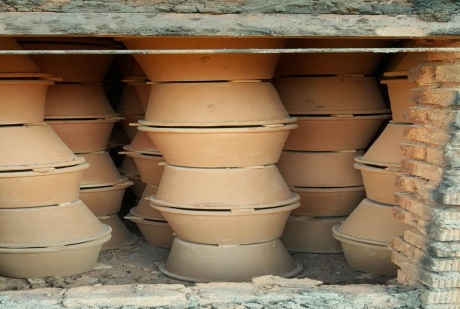Imperial student helps Ugandan charity improve water filtration technology

(L-R) Kathy Ku, the co-founder of Spouts, and Imperial PhD student Wirat Lerdprom
A PhD student from Imperial has shared his knowledge of ceramics with a charity to help improve the way water is purified in Uganda.
Since Lerdprom's first visit, the factory has increased the production yield of water filters from 55 per cent to 86 per cent - the best in their production since they started operating.
.
Wirat Lerdprom, a postgraduate student from the Department of Materials at Imperial College London, travelled to Uganda in January 2017. He was aiming to make a more efficient production process for manufacturing water filters developed by the charity Spouts of Water.
In Uganda, over ten million people lack access to a clean water source, resulting in negative health, social, economic and environmental consequences. Spouts of Water manufacture and distribute Purifaaya ceramic water filters using local materials, providing an affordable and easy-to-use solution for Ugandans to purify their water.

(L-R) Kathy Ku, the co-founder of Spouts, and Lerdprom with the water filters.
Lerdprom visited the rural factory in Uganda for five days. Using his knowledge of ceramics, he gave expert advice to the local workforce on how to improve the production process of the water filters.
His expertise helped to enhance the preparation of the raw materials, including the mixing and drying process of the ceramics, and improved the firing efficiency of ceramic whilst in the kiln. Since his first visit, the factory has increased the production yield of water filters from 55 per cent to 86 per cent - the best in their production since they started operating.

Holes in the clay only allow water molecules to pass through, leaving larger harmful dirt and bacteria trapped in the filter.
Despite it being unrelated to his current PhD project at Imperial, which is exploring techniques to reduce the processing time when creating porcelains, Lerdprom welcomed the opportunity to assist Spouts in helping many Ugandan’s access clean water.
He said: “I’m really happy to be involved with this project; I’m proud that I can use my expertise with people in the real world. I thank Imperial for making this possible, especially Professor Lee.
“This is an amazing feeling for me, as I know it’s so difficult to find water there. When I was in Uganda, I had no water or power, so it’s great to know that more people can now have clean water to drink thanks to my knowledge,” He added
Lerdprom’s visit to Uganda was in response to a request from Kathy Ku, co-founder of the Spouts of Water. She had initially reached out to the Royal Academy of Engineering to seek assistance with the water filtration project she was running. Lerdprom was suggested as a suitable candidate for the project by his PhD supervisor, Professor Bill Lee, Chair in Ceramic Engineering at Imperial, after he heard about the assistance requested by the charity via the Royal Academy of Engineering.
Dirt and bacteria are trapped in the filter
The Purifaaya ceramic water filters produced by Spouts use both physical filtration and chemical disinfection methods. Tiny holes within the clay only allow water molecules to pass through, leaving larger harmful dirt and bacteria trapped in the filter. A thin layer of silver nitrate is also infused within the filter to enhance bacteria removal.
The filters are made by local people using traditional methods, as rural locations and little money mean comprehensive modern production methods would not be possible to achieve. It also has the potential to reduce deforestation because less wood is needed to be collected by locals to purify water by boiling it. Manufacturing the filters in Seguku, where Wirat was based, and at multiple other Spouts factories around Uganda also has the potential to improve local economies by generating jobs.
Kathy Ku, the co-founder of Spouts, worked alongside Wirat in Uganda. Ku said: “Wirat was only able to visit Spouts for five days, but during those days, he was able to help make improvements and find solutions for problems we'd been struggling with for years.”
“Having his expertise come to our site, bringing both industry and academic know-how, was invaluable; we look forward to continuing our partnership with Wirat to help provide clean drinking water across Uganda.”
Find out more about the work of the charity at the SPOUTS of Water website.
Article text (excluding photos or graphics) © Imperial College London.
Photos and graphics subject to third party copyright used with permission or © Imperial College London.
Reporter
Tori Blakeman
Communications and Public Affairs